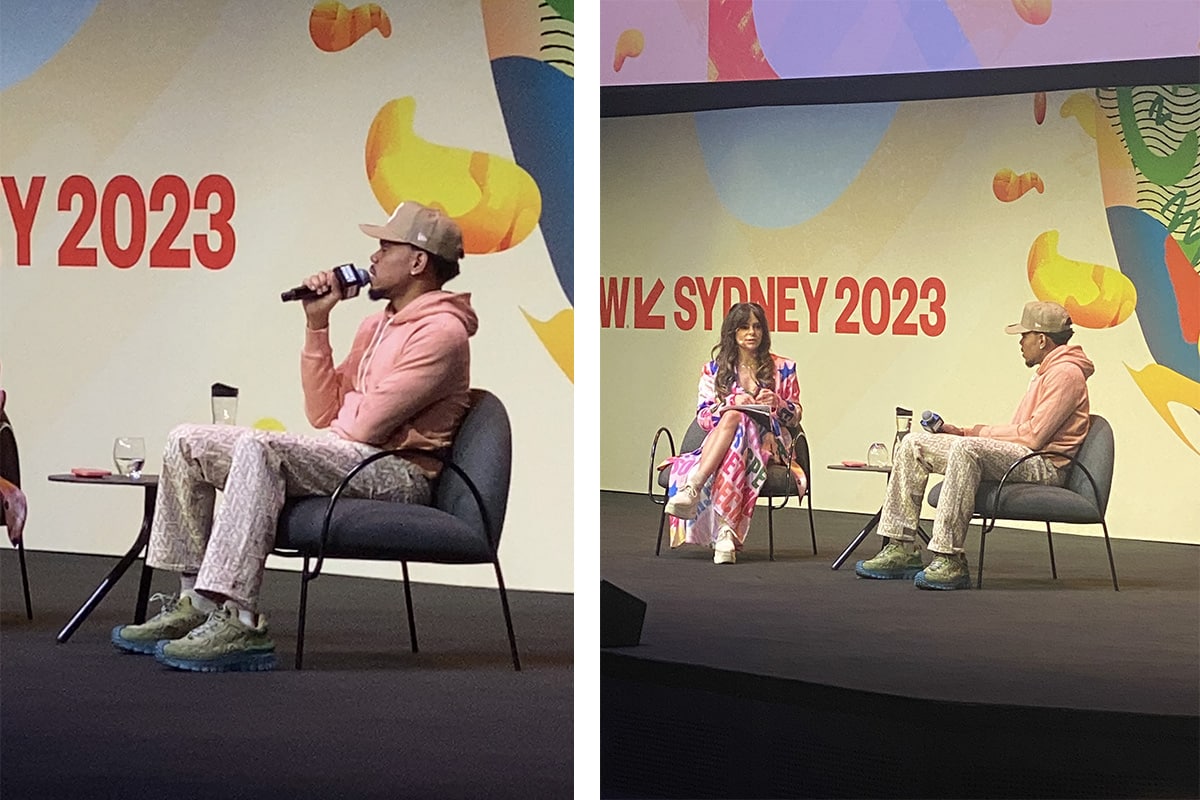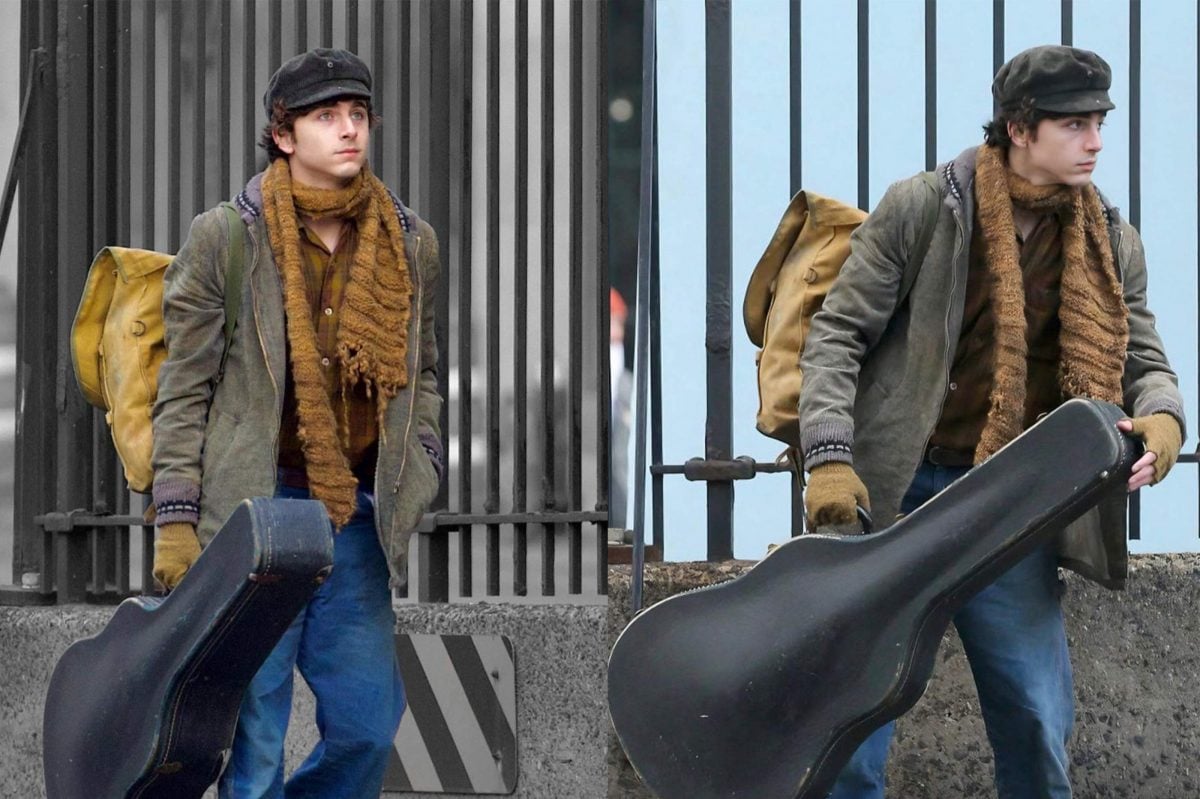
Chance the Rapper at SXSW Sydney was arguably one of the most anticipated sessions on the festival's lineup. It explains why, an hour before the keynote address in celebration of the 50th anniversary of Hip Hop was set to take place, hundreds of people sat outside the theatre in neat queues, buzzing with excitement.
As the rapper pointed out on stage, this conversation was a full circle moment for him. In the early days, when he had just turned 19 years old, he took a 26-hour solo train ride to Austin to perform at SXSW with the band Kids These Days, which was how he later landed a tour slot with Childish Gambino. He chose his moment on stage to discuss creativity, his charity SocialWorks, and most saliently, the recent Voice to Parliament referendum. Find some key moments from that discussion, below.
The opening address by Nooky...
Before Chance the Rapper rolled into a dialogue with Poppy Reid, the session was opened by Yuin rapper Nooky. In his opening address, Nooky paid tribute to the great Aboriginal activist Charles Perkins. "Hip Hop is my freedom ride," he began.
"Hip Hop is Black music and we are Blak people. Although we're on the other side of the water it resonated with us because of its ability to empower and to mobilise; and to join Blak people together in strength and love and push us forward... It revitalises our culture and helps keep it alive when everything was done to erase it. It made me feel like a strong Blak boy when that wasn't the narrative out here; it helped me take back my power, tell my truth, and tell the truth of this country. It enabled me to be that warrior I so wanted to be."
On his friendships...
"My friends have been the same friends from when I was in school. My relationships, for the most part, stayed wholly intact when it comes to being affected by my successes. But I'm also human, so those relationships I'm commenting on a lot of the times [in my music] went sour because of shit that I did. I'm not a piece of shit but I'm also not the best person in the world. I'm human.
So with Summer Friends, which is a record I love, it's a further examination of the shortness of relationships. So on Acid Rap, there's this song called Paranoia which is about this understanding we grew up with in Chicago that in the summertime the city gets very dangerous – there's a lot more shootings, passings – and you can go away from school with a certain number of friends and when you get back some people have died. I expressed that on Paranoia through the lens of violence, so when I did Summer Friends it dived into how these relationships sour – because it's not always through violence. I really love that song because it's a further examination of myself, as opposed to an examination of how society was working around me."
On Chicago...
"Chicago has been the epicentre and ground zero for so many huge, not only music movements but also political movements. On the music side, specifically Black Gospel music was really refined and came out of Chicago with Mahalia Jackson and so many other amazing foremothers and forefathers. It's also that way with Jazz, Blues, House music, Ghettotech, Juke music, even in Hip Hop with Drill – they all started in Chicago.
It's the same thing with political movements. So much of the civil rights movement was fought in Chicago. If you think about the DNC riots – Bobby Seale was bound and gagged in court. There's so many different high-impact revolutionary and radical movements that happen in Chicago that we're all affected by.
For example, Kanye's mother was arrested at sit-ins when she was a little girl. So, obviously that's going to be in Kanye's DNA. My mother was a participant in the Black Panther's Free Breakfast Program, so that's in my DNA. A lot of us have a very close relationship with the struggle and movement just because we live in Chicago. It's the most geographically segregated city in America. You grow up around Black people your whole life, it's only once you get a job or test into a good school, then you start being around diversity. Then you realise you're the diversity – you're what's getting added into the mix to make people feel better."
On joy in his music...
"You can't falsely produce joy. To me, joy comes from the lord... But I also try not to be naive or oversimplify the real issues we face. And so, even if it comes in a packaging that feels good to the soul, the more you listen to the lyrics, the more you be impacted by your understanding on what we go through."
On his faith in Christianity...
"I've gone through a lot of different theological understandings of the word God. I guess my most recent one comes from James Cone, he's written a lot of great books if you get a chance to read them. The understanding that I have now is that God is the God of the oppressed. His will is that we be free and are allowed to be ourselves, and come into the kingdom that he presented to us. There are so many places around the world where you see oppressed people that are voiceless; just the willingness to still pray to God, love God and ask him for assistance is a testament to the strength of the oppressed. And it's not just a Black People In America Thing..."
Chance the Rapper asks the audience to raise their hand if they voted Yes in the Voice Referendum.
"The point that I'm making is that there are so many movements around the world where people want to be and deserve to be recognised as people, as humans. And in most places, brown people, Indigenous people, are at the bottom. We have to get to a point where we recognise the voiceless people, we platform the voiceless people and we listen to the voiceless people."
On privilege...
"Oppressed people make great art, for sure – but also, they've been here for 65,000 years, and taught agriculture and society to so many people. To understand them is outside of art and the beauty of things. It's also the ugliness of things and being able to recognise where you were assisted and where you were allowed in. And being gracious enough and humble enough to recognise where you are in the world and where the people you owe things are in the world."
On the meaning of life...
"I'm going to get this one wrong. The meaning of life, I think, is opportunity. The opportunity to impact and impress upon the world. You can build or destroy. You could be a giver of life or a taker of life. You have the opportunity every moment of every day to impact people. I believe my purpose in life is to allow God to speak through me; to be a vessel for love, liberty and understanding. And I try and work against my flesh every day to take that opportunity and not to waste it."
On dealing with critics...
"Here's the truth of it, you've got to go outside. You've got to go see what real people are feeling and going through."
On creativity...
"You've got to create for yourself. When you first started singing or rapping or painting or dancing or acting, you didn't have any fans. You had one fan, you had yourself. That's how I started creating. I never created to win a Grammy or have someone on Twitter tell me I was doing a good job. I was rapping because I love music and I'm good at it.
It's really important to remind yourself that at one point you were singing in the shower and you liked the way it sounded. No matter what, you have to create out of that need. If you're not inspired and you don't love what you're creating, it will always be contrived. Always sing for the person who first made you want to sing, which is, yourself."
On his charity SocialWorks...
"Historically Chicago is always disinvested in the south and west sides, where it's predominantly Black and hispanic populations. So SocialWorks works with youth in the schools, we create after school programs, summer camps. We also work with the homeless population – or the transient population, as we say. We do civic engagement education, so learning how to advocate for yourself and engage with the political systems in America."
On being an independent artist...
"For those of y'all that don't know, I'm a 100% independent artist. I own all of my own masters and have the amazing opportunity to navigate this whole career and life myself, which is not common in the music industry as a whole. I was granted that opportunity because of my mixtape Acid Rap.
We look at labels for validity a lot of the time. It's kind of changed recently because we see more independent acts, but for the most part people look at a label – being signed and having a deal – as what officially makes you a rapper or a real musician. But when I got to go on my own headlining tour for Acid Rap, and sold out shows around the country and started touring internationally, I kind of was just like 'fuck the label', I don't really need them.
Beginning to see my own power changed my understanding of what it means to be an artist and what it means to have control. So I think Acip Rap was my opportunity to be like 'this is my identity, this who I am, this is how I feel, this is my career choice'. And it also allowed me to look at myself and see that I was okay with who I am.
The label is always taking home the lion's share and you're always being controlled by somebody who – in layman's terms, can't rap? I think you start to realise that the power dynamic of the people with the money and the people with the ideas is lopsided.
...If you ever watch any biopics on any famous artist that you love, any musician, there's going to be some scene in the movie where they get fucked over by the label or the manager or the publishing company. Again, that's because those dudes can't rap.
I mean you can't really stop me because I'm so raw but the attempts were there for sure. It's not always so intentional and targeted. But also, I was the only person doing it that way for so long, so once you're the outsider, the further outside you get the more you look like the enemy."



